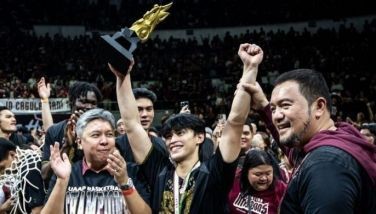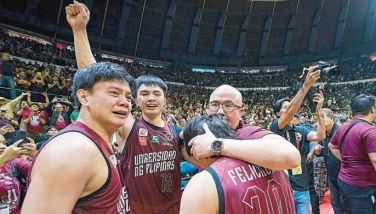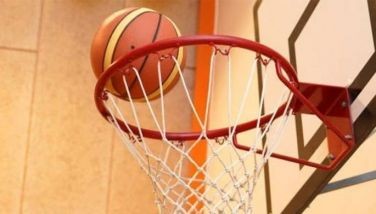Col. Antonio Taguibao’s Powerful Trip
October 9, 2005 | 12:00am
 How does it feel to lift a load of 200 kilograms, hold it over your head and wait for the referee’s command to put it back down?
How does it feel to lift a load of 200 kilograms, hold it over your head and wait for the referee’s command to put it back down?
Col. Antonio Taguibao, powerlifter par excellance, says you have to have a good back, properly trained muscles and the strength to sustain weight that is three to four times your body weight.
The applause, the clicking of the camera shutters, the occasional press coverage (like this one) and maybe a medal at the end the day may be quieter rewards for a sport that is not as glamorous as hitting a dimpled ball around a landscaped course or trying to get a large rubber ball through a hoop, with swooning fans and million peso contracts waiting off the courts.
But powerlifting has the same high as any sports; it is always a battle against the self and what the body can do against overwhelming odds - in this case, weight - that leave spectators in awe.
Powerlifters in this country–and their number is increasing–are bemadalled athletes that consistently reap awards in powerlifting competitions, sans the fanfare.
At 47, Taguibao, who currently holds many Philippine records in the open division, masters I division and the masters single lift bench press, is still actively competing in the world powerlifting scene.
In October, he is flying to Pretoria, South Africa to defend his title in the World Masters Powerlifting Championship, one of the country’s four delegates to represent the Philippines in the power match.
So far, Taguibao is the only Filipino to clinch the World Masters’ Championship title for four consecutive years, from 2000 to 2003. At the World Masters Championships held at the Czech Republic in 2000, Moose Jaw, Canada in 2001, Cordova, Argentina in 2002 and Regina, Canada in 2003, his total medal haul was 13 golds, 2 silvers and one bronze.
From 1988 to 2003, Taguibao had also competed in Asian championship matches in Japan, Taiwan, India, Kazakhstan, India, Uzbekistan, and South Korea, earning a 11 bronze medals, 13 silvers and six golds.
That he is currently in the thick of training didn’t show in his face when Starweek interviewed him at the Zest Gym in Quezon City where he trains.
His training regimen is not deadly as it seems. Back training every eight days, leg training every six to seven days and exercises for the upper body every four to five days, all sessions lasting one and a half hours on average.
That is why, he said, most powerlifters in this country have other jobs, other passions or pastimes and most have jobs not related to sports.
When he is not lifting weights, Taguibao is full time military officer. He is a commanding officer of the Armed Forces of the the Philippines, a consultant at the Philippine Sports Commission, and runs a general merchandise store.
So why still compete in a back breaking sports when everything is stable in his professional life and the fires of youth had somehow simmered gracefully through the years?
"I have always been into sports," he said. "I first tried basketball, then marathon, then softball. My goal then was to get a slot at the UP Athletes Quarters, where members of the different sports teams live, to save on transportation cost.
He had joined tryouts in basketball and marathon but didn’t quite make it. The lucky break came when he met UP weightlifting team captain Ramon Debuque, who needed players to compete in a national novice competition at the Rizal Coliseum, now the Rizal Memorial Complex.
It was 1976 and few people were then into weightlifting, Taguibao became part of the team that trained rigorously for six months. That year, Taguibao won the gold in the flyweight division.
His college dream of staying at the athlete’s dorm was fulfilled, but he lingered a long while at the state university, he said, hopping one course to another, from foreign service to political science to marine biology but finally tucking a degree in Veterinary medicine in 1982.
Later he also obtained a diploma in Physical Education from the UP College of Human Kinetics and a Masters in Public Administration at the Baguio Central University.
His foray into sports were equally circuitous. He didn’t stop at lifting weights, he was also part of the UP wrestling team that competed with a Japanese core of volunteers sometime in the late ’70s. But it was in powerlifting that he made his real mark.
Taguibao emphasized that there is a difference between weightlifting and powerlifting.
In weightlifting, he said, there are two basic events–the two-hand snatch and the clean and jerk. In the snatch, the bar is pulled from the floor to a full arm’s length overhead, bending the legs to carry the weight overhead. In the clean and jerk event, on the other hand, the bar is raised from the floor to shoulders, bending the legs quickly and then raising it to a full arm’s length.
Awards are given to the two separate events or to the combined performance in both events and the medal is usually given to the one who lifts the greatest total weight in competition.
In powerlifting, there are three specific disciplines - the squat, the bench press and the dead lift. Gamely posing for the cameras, Taguibao demonstrates the three positions, all the while explaining what a good lift is.
"Posture, position and timing are important," he said. It is not just the ability to lift the bar, one has to wait for the referee’s command when you are going to put it down or to proceed to the next position. It is a test in muscular endurance, flexibility, and human strength.
The squat starts with the bar resting on the lifter’s shoulders then the athlete lowers to a squatting position, returns to a standing position and returns the bar to the rack.
In bench press, the athlete lies in a bench and raises the bar at arm’s length, lowers it to the chest and returns it on the rack.
The deadlift, which may yet be the most difficult of the three disciplines, has the athlete lifting the bar from the floor using both hands up to full standing position.
Taguibao’s best official lifts are 212 kg. for the squat, 97.kg for the bench press and 227 kg. for the deadlift. With these personal bests, he was named national open best lifter ten times, national masters best lifter five times and Battle of Championships best lifter six times.
But part of the satisfaction of a professional athlete is in seeing the development of the game into a full-blown competitive sports.
Taguibao said that even women and the disabled are now into weightlifting and powerlifting such that the country is regularly sending a national team to Asian and world championship matches.
He, along with the pioneers in the field, are now active coaches and trainors. Taguibao is a certified powerlifting federation category I referee. From 1993 to 1995, he also headed the Philippine Military Academy’s powerlifting squad.
As with any other discipline, it is only in giving back that you come full circle.
BrandSpace Articles
<
>
- Latest
- Trending
Trending
Latest
Trending
Latest
Recommended



















